Chicago Cop Convicted Of Second-Degree Murder In 2014 Shooting
Nearly four years after the fact, a Chicago Police Officer has been found guilty of murder in the shooting of 17-year-old Laquan McDonald.
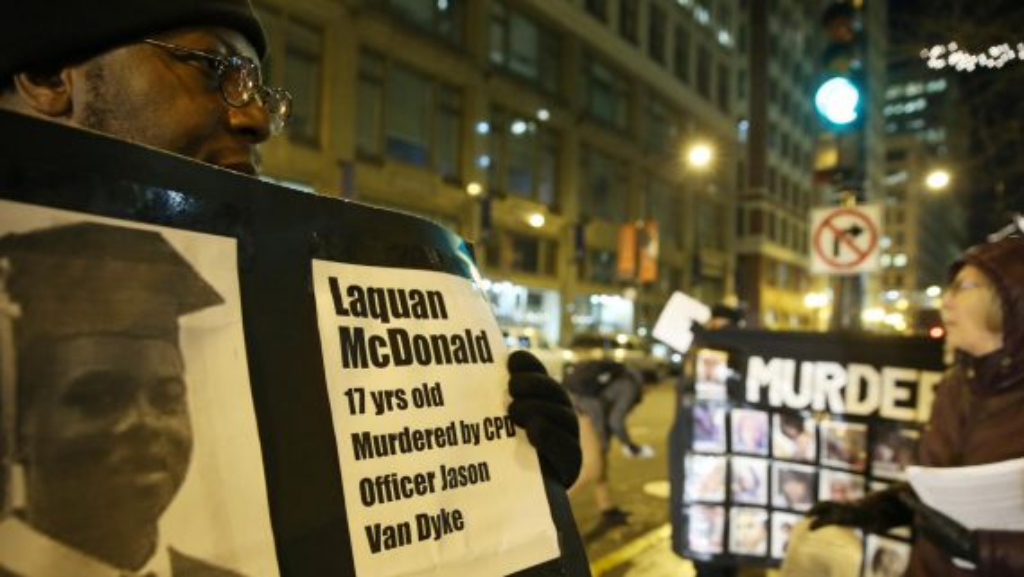
Nearly four years ago, a 17-year-old African American teenager named Laquan McDonald was shot and killed by Chicago Police Officer Jason Van Dyke in an incident ended up having a significant impact on Chicago city politics and the fate of Mayor Rahm Emanual. For more than a year, the Chicago Police Department declined to release dash cam video of the shooting as it investigated the case and, when that video was finally released, it became apparent that there were serious questions regarding the propriety of the shooting. Largely peaceful protests demanding justice erupted across the city in the wake of the release of that video, and Van Dyke was eventually charged with first-degree murder in the shooting. Three years later, Van Dyke, who has been on trial for the shooting for the last several weeks, was convicted of second-degree murder and several other charges yesterday afternoon:
CHICAGO — For three years, Chicago was racked by the political, legal and emotional impact of a chilling video that lasted only seconds: A black teenager could be seen collapsing onto a street as a white police officer shot him over and over, 16 times in the end.
On Friday, the officer, Jason Van Dyke, was found guilty of second-degree murder, a decision this city had anxiously awaited for months. Officer Van Dyke, who silently folded his arms behind his back as he was taken into custody, was also convicted of 16 counts of aggravated battery with a firearm — each count read aloud in the packed courtroom, one for each bullet that struck the teenager, Laquan McDonald.
No Chicago police officer had been convicted of murder in an on-duty shooting in nearly 50 years, and this city had braced for the possibility of an acquittal and a furious response that seemed certain to follow. But when the verdict came, protesters who had gathered outside the courthouse suddenly broke into cheers. Others wept, calling out: “Justice for Laquan! Justice for Laquan!”
For some residents, the trial became a proxy for years of anger over police mistreatment of black Chicagoans and over decades-old doubts about police accountability and transparency. They said they were relieved at the outcome and hopeful that it might force changes in policing and relations with city residents.
Dashboard-camera video from a police car gave a clear view of the shooting, though the city for months resisted releasing the images and Chicagoans only saw it 13 months after it happened, on a judge’s orders. The fallout was significant: The police superintendent was fired, the local prosecutor lost her re-election bid, and Mayor Rahm Emanuel announced shortly before the trial began that he would not seek re-election next year.
“That video had a profound effect upon this city, not just on policing but on politics, and not just in black and brown neighborhoods — it rippled across every neighborhood,” said Lori Lightfoot, a former president of the Chicago Police Board, an oversight agency, who is now running for mayor. “People saw it and just said, ‘Dear God, what happened?’ and ‘What do we need to do so that that never happens again?'”
Police union leaders and supporters of Officer Van Dyke sharply criticized the outcome, and said it would have an instantly chilling effect on officers who were simply trying to do their jobs and stop crime. “This sham trial and shameful verdict is a message to every law enforcement officer in America that it’s not the perpetrator in front of you that you need to worry about, it’s the political operatives stabbing you in the back,” Chris Southwood, a state leader of the Illinois Fraternal Order of Police, said.
Chuck Wexler, executive director of the Police Executive Research Forum, suggested that the verdict could affect policing beyond Chicago, particularly when officers confront residents carrying knives and knifelike weapons. “Departments will be taking a second look at how they train officers to deal with individuals with edged weapons,” Mr. Wexler said.
More from the Chicago Tribune:
Minutes after being convicted of murder, Chicago police Officer Jason Van Dyke rose in the packed Cook County courtroom to be taken into custody. He had already said his goodbyes to his wife and family.
Looking fatigued but calm, the veteran patrol officer put his hands behind his back as his attorney, Daniel Herbert, clapped him on the back of his shoulder. As sheriff’s deputies escorted Van Dyke out of the courtroom, Herbert flashed him a thumbs-up.
With that, one of the most closely watched trials in Chicago’s history came to an abrupt conclusion.
A jury Friday convicted Van Dyke of second-degree murder and 16 counts of aggravated battery with a firearm in the death of 17-year-old Laquan McDonald, marking a stunning end to a racially tinged case that roiled the city when the now-infamous police dashboard camera video of the shooting was released three years ago by court order.
Van Dyke is the first Chicago police officer in half a century to be found guilty of murder for an on-duty shooting. He faces a minimum of six years in prison when he is sentenced by Judge Vincent Gaughan. The jury acquitted him of a single count of official misconduct.
Jurors told reporters that most of them thought Van Dyke guilty when they entered deliberations but were initially split over whether to convict him of first- or second-degree murder. In the end, after deliberating for about 7½ hours, they settled on second-degree murder, finding that Van Dyke was frightened when he fired his gun but that his fear was unreasonable.
(…)
The charges against Van Dyke centered on the dashcam video depicting the moments leading up to the shooting on Oct. 20, 2014 — footage that has been played around the world for nearly three years. The graphic images sparked protests and political upheaval and led to a sprawling federal civil rights probe into the systemic mistreatment of citizens by Chicago police, particularly in the city’s minority communities.
Throughout the trial, prosecutors highlighted how other officers involved in the incident operated with restraint, content to let McDonald walk away while they waited for backup cops with a Taser to arrive at the scene. One officer, in fact, trailed McDonald on foot for about half a mile over several blocks, never threatening to shoot. Van Dyke, however, opened fire just six seconds after stepping out of his squad car with his gun drawn. The car with the Taser arrived at the scene 20 seconds after he stopped shooting.
Several of Van Dyke’s fellow Chicago police officers testified for the prosecution, including Joseph Walsh, his partner that night who was granted immunity from prosecution while awaiting trial on separate criminal charges alleging he helped cover up details of the killing to make it appear justified.
The jury heard from dueling forensic pathologists who came to starkly different conclusions about McDonald’s death as well as two police use-of-force experts who disagreed on whether Van Dyke was justified in opening fire.
At times, witnesses called by one side wound up helping the other.
Walsh, for example, backed up Van Dyke’s version of events during his testimony as a witness for the prosecution, even stepping from the witness stand to demonstrate for the jury how he saw McDonald raise the knife to his shoulder in a threatening motion before his partner fired.
Perhaps more importantly, a psychologist paid by the defense testified that in the moments before Van Dyke had arrived on the scene, he told his partner that he might have to shoot the offender.
“Oh my God, we are going to have to shoot the guy,” Van Dyke recalled saying during an interview with psychologist Laurence Miller, according to Miller’s testimony.
Civilian witnesses also provided key testimony. A truck driver whose 911 call sparked the police response that night testified for the defense that McDonald tried to stab him when he caught him breaking into trucks. Two eyewitnesses — a father and son — testified for the prosecution that McDonald made no threatening movements toward the officer before he was shot.
The father, Jose Torres, the prosecution’s final witness in its case in chief, said all the shots fired at McDonald “upset me.”
“‘Why the f are they still shooting him when he was on the ground?'” he recalled himself asking out loud at the time.
But the case largely boiled down to the dashcam video that depicted the shooting as it unfolded as well as Van Dyke’s testimony in which he tried to explain his actions.
The video, played dozens of times for jurors over the three-week trial, showed Van Dyke and his partner pulling up to the scene as McDonald walked south in the middle of Pulaski Road, holding a 3-inch folding knife. Both jumped out with their guns drawn.
Six seconds after Van Dyke exited the car, he took a step toward McDonald — closing the distance to about 12 feet as the teen continued to walk at an angle away from him — and opened fire. McDonald spun and fell to the pavement.
Van Dyke continued firing for at least 12 seconds while McDonald lay prone in the street, emptying all 16 rounds into his body, prosecutors said.
Here’s the video that Chicago Police did not release for more than a year:
Based on the video, it quickly becomes apparent that Officer Van Dyke acted improperly that October night in 2014. Not only did he discharge his weapon sixteen times within less than a minute, but he did so within less than two minutes after rolling up on the scene. By the time Van Dyke existed his cruiser, it was clear that McDonald was clearly walking away from officers and was not acting in a manner that could conceivably be considered a threat to any of the officers who were on the scene or any of the many of the members of the public. To be fair, it does appear that McDonald was impaired at the time of the incident, something that can be seen in the somewhat haphazard manner in which he was walking and other evidence regarding his behavior on the scene. It’s also true that he did have possession of a “weapon, although it seems obvious that it was impossible for him to have been a threat to anyone. For one thing, as I noted, McDonald was moving away from police and members of the public at the time of the shooting. For another, the weapon in question was a very short collapsable knife that wasn’t pointed at anyone, and which certainly could not have threatened anyone at the time McDonald was shot. Taking all of that into account, it is impossible to justify what unfolds on this video and, taken together with all the other evidence in the case it seems clear that the jury reached the proper verdict in this case.
According to reports, the jury, which took just under eight hours to reach a verdict, was initially at odds over whether to convict Van Dyke of first or second-degree murder. In the end, it appears that they ended up convicting Van Dyke on second-degree murder due to the fact that they found the defense’s argument that he believed that he was in danger at the time of the shooting and that his use of force was justifiable, but that this belief was not justified. In essence, this made the difference between first and second-degree murder for the jury and, given how those offenses are defined in the Illinois Criminal Code, it’s understandable why the jury ultimately ended up going with the lesser-included offense. The only caveat I would add to this is the testimony of Van Dyke’s partner, who testified that Van Dyke was talking about having to shoot the suspect before they had even arrived on the scene. Arguably, this is evidence of the kind of intent necessary to establish first-degree murder. In any event, Van Dyke’s conviction means that he will spend at least six years, and potentially as many as thirty years in state prison. Given the fact that he’s a former police officer, he’ll likely have to be kept in some form of protective custody, meaning that he won’t be mixing much with the general population and will be spending a lot of time on his own pondering what he did that got him there.
Van Dyke’s conviction is notable, of course, because it is generally speaking an exception to what we generally see in police use of force cases even when the evidence against the officers is strong and compelling. In many of those cases, such as the deaths of Michael Brown, Eric Garner, and Tamir Rice, the authorities have not even brought charges, claiming to the dissatisfaction of many that the available evidence indicated that the officers had not acted improperly. In other cases, such as the death of Freddie Gray while in police custody or what clearly seems to have been the cold-blooded murder of Walter Scott in North Charleston, South Carolina. In Gray’s case, several trials resulted in acquittals of the officers involved, see here, here, here,and here, after which the local prosecutor decided to drop the case altogether. In the Walter Scott case, even a video that seemed to clearly show the officer shooting Scott in the back and planting evidence on him before other officers arrived wasn’t sufficient to convince a jury in state court, although the officer involved, Michael Slager, ultimately pled guilty in Federal Court in connection with the case. More recently, a Lancaster, Pennsylvania Police Officer was caught on video using a Taser against an obviously compliant African-American man and a Pittsburgh Police Officer was indicted on criminal homicide charges in connection with the death of a 17-year-old African-American man. Given this history, and the qualified immunity generally given to police officers in these cases, Van Dyke’s conviction is a notable and proper exception. Hopefully, it will lead to further scrutiny of these types of cases in the future.

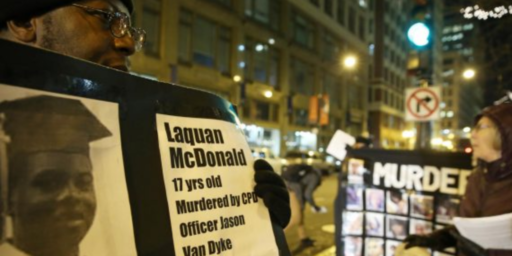
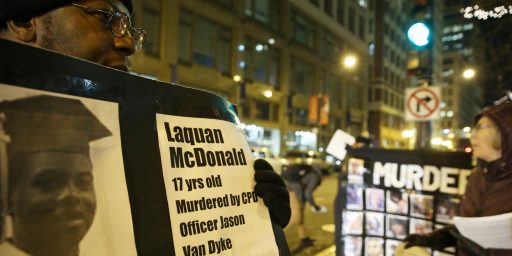
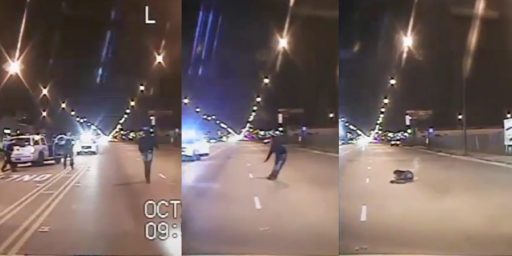
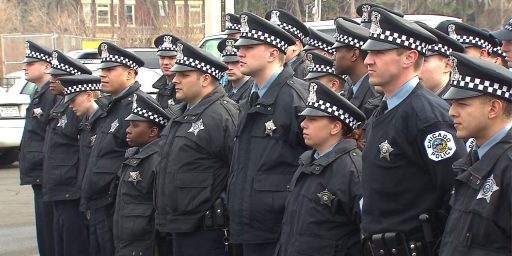
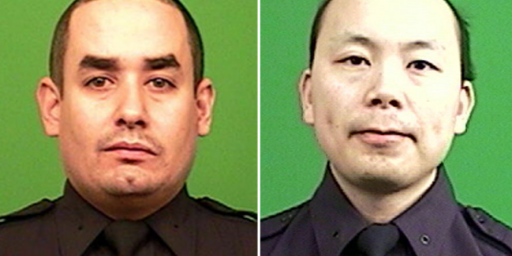
I love how Fox News quotes the police union without a trace of sarcasm
https://www.foxnews.com/us/police-union-leader-blasts-van-dyke-verdict-says-it-resulted-from-sham-trial
I think they don’t agree with the verdict.
Camera phones proved two things: No, there re no flying saucers, and yes, cops are brutal and racist.
You know who wouldn’t have murdered Laquan McDonald? Any European Union police force. Or any Australian or New Zealand police force. Why? Because people in those countries are not armed to the fcking teeth so that cops have to ride around in a constant state of hair-trigger paranoia.
Combine our sick gun culture with our persistent racism and you get dead black men shot down in the streets for no reason.
That’s silly Michael. Try 40 years of one party, your party, rule and the arrogance that comes with it.
Let’s just hope the guy gets a max sentence.
@Mu:
It’s not entirely surprising that academic research has shown a correlation between locales with strong police unions and higher amounts of excessive use of force complaints. Correlation doesn’t equal causation, but it’s still striking.
It’s also striking to see how many otherwise anti-union conservatives offer unwavering support police unions (and ugly statements like these).
Doug wrote:
This really speaks to the incredible amount of latitude offered police officers by most juries. It’s why convictions like this remain so rare (as plays out in across all of the evidence you offer in the next paragraph).
Michael raises a complicated subject. Since 1980 the U. S. has averaged 64 line of duty killings of police officers per year. Over the same period France has averaged a dozen per year but our population is five times France’s so the police officers killed per 100K population is about the same. On the other hand despite France’s much tougher gun laws than ours France is believed to have among the highest rates of firearm ownership of any European country, mostly illegal.
While I agree with Michael’s view, indeed, think it’s self-evident that the number of gun homicides in the U. S. would decline if we disarmed the population, I disagree with his assumption that police officers are behaving rationally when they’re afraid. They aren’t. In Chicago at any rate the line of duty homicide rate among police officers is quite low. Statistically, it’s a lot safer to be a Chicago cop than it is to be an ordinary Chicagoan.
Why, then, are the police so afraid? I think that the solution is that we need to change how our police officers are recruited, trained, and the practices used in assigning police officers to street duty and what they do when they’re there. We need to demilitarize our police. Today a very large proportion of our police officers are ex-military and, consequently, have military training. They probably think of serving as a police officer as a continuation of their military service with the public in the role of the enemy. There are probably many who are suffering undiagnosed from PTSD, possibly pre-existing.
I’m forced to conclude that the Police Union in this community is broken and needs to be replaced–not disbanded, officers still need economic protection, possibly even more so in these circumstances–by one that can see the role of police in the community more clearly.
While I agree about officers not acting rationally under stress, I think that it’s important to note that when under stress one tends to become more of who they are by nature, not less. Years ago, a demographic study of police forces in the US showed that police officers overwhelmingly come from social cohorts that believe that violence is a tool to solve problems. It seems that we’ve not been able to correct that feature. Maybe it’s insolvable.
@Dave Schuler:
A couple years ago I did a little research. I don’t recall the specifics but your avg cop is likely to live 1/10th of a year longer than your avg regular every day person. It is a statistically indifferent number. So is the chances of them dying on the job.
@Just nutha ignint cracker:
They actually left out the most reprehensible part of the statement:
“What cop would still want to be proactive in fighting crime after this disgusting charade, and are law-abiding citizens willing to pay the price.”
In other words, unless you are willing to let us kill who we want to kill, why should we bother to protect you?
@Dave Schuler:
110% on all points. The military to police pipeline is a deep, deep problem. Unfortunately, it’s only getting worse — especially under this administration/DoJ that explicitly has articulated a belief that it should be accelerated (and overturned the baby steps taken under Obama to roll some of that back). Vendors also play a huge part in that (as they want access to lucrative pubic safety budgets).
You are entirely correct that this is a training and culture issue. Police are taught, for example, that traffic stops are the most dangerous engagement (in part because they are, but that has as much to do with the risk of being hit by a passing car as anything else) and to assume that everyone is armed. Sprinkle in implicit bias issues and suddenly children (especially those of darker skin tones) look like dangerous men and everyone is reaching for a gun.
This gets worse in communities where fees and fines are seen as a revenue source to offset tax cuts. For-profit (or really for low taxes) policing completely changes the relationship of a community to its public safety forces.
In addition to your suggestions, we also need better data collection and publishing. For example, the number of police killed in the line of duty needs to be clearly broken out as, depending on the count, that also includes people who died in car crashes moving towards the scene of an event. Likewise, we need much better statistics on the job injury rates.
As I’ve learned in the last 6 months, the state of criminal justice data collection/reporting in the US is awful — it should be a national scandal.
The other problem is the fact that in many communities, police have become the first line of engagement in lots of mental health interventions. And that is a job that they are fundamentally ill-prepared for, which only sets them up for further failure.
@mattbernius: As I noted, the subculture of the city that is the police union is broken and needs to be replaced. If it becomes broken enough, a reactionary force among the policing “victims” in the community will arise and neighborhoods in the city can become stand-ins for Oakland, CA in the mid 60s.
On a more positive note, the conviction represents a realization in Chicago that black lives DO matter and maybe the city will work to transform its policing–personnel and policy together. And, in honor of Mr. Pearce’s hobby horse, maybe the police will shoot less citizens overall regardless of color.
@Dave Schuler: About ten years ago I was in Chicago for personal reasons. I was at a gathering that consisted of white people who were well off (all solid 6 figure income each). They were the picture of people who would never have a bad run in with the cops. It still sticks in my mind how I was warned multiple times that evening to stay clear of the cops.
I would argue the militarization of the police combined with the tendency for departments to hire former military is a big part of the problem. That’s how you end up with cops calling the rest of us “civilians” and other us vs them stuff.
Former military isn’t a problem on it’s own they just need to realize they aren’t soldiers anymore and it’s not us vs them.
The short answer is: A lot of people are afraid of guns, including cops!
IMO we need to teach gun handling and safety from a young age. If you learn the truth about guns you will respect why we have them! Protection & Hunting for food!
@Edward Drew:
I think you are missing the point. This is simply an irrational fear of guns.
It comes down to viewing anyone you are interacting with during a stop as a potentially hostile combatant and a direct threat. And much of that does come down to training and acculturation. Take the case of Phillip Castillo. There is little question that once the officer in question learned that he had a weapon, he assumed Castillo was going to use it on him. Hence every move Castillo made became a threat.
Add implicit bias issues to that and things only get worse.
Firearm education will do little to change those underlying structural issues.